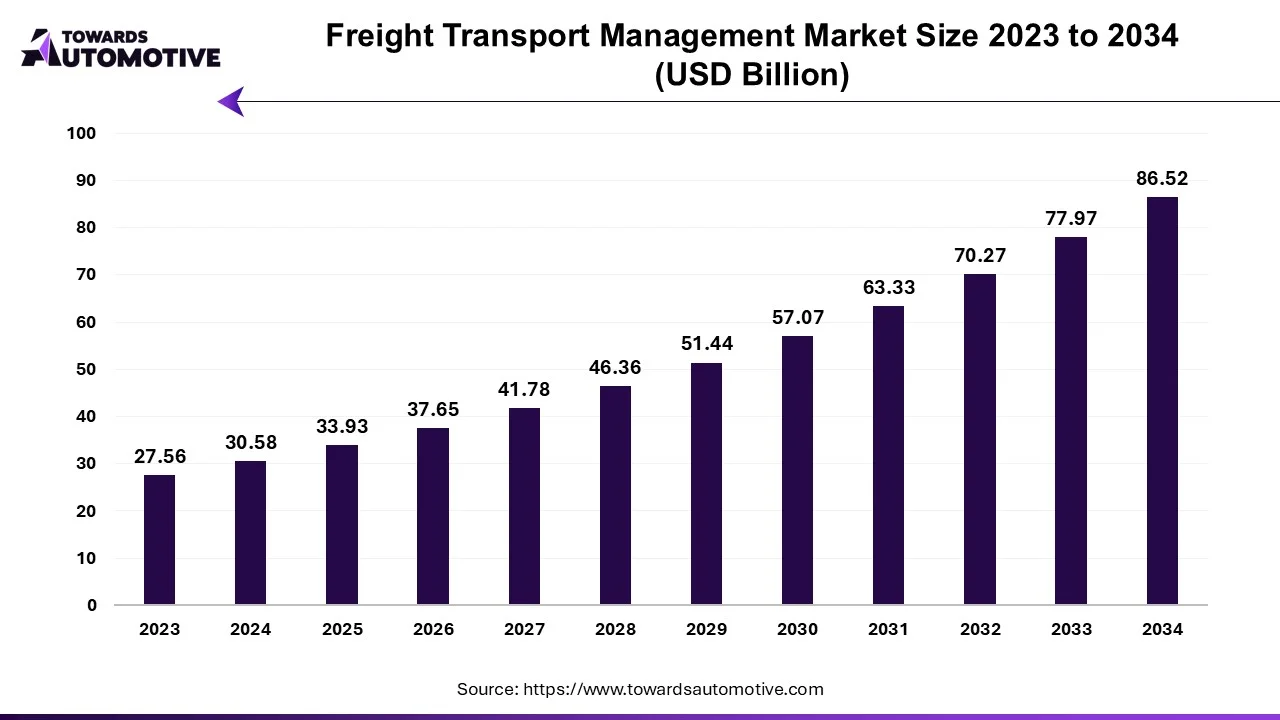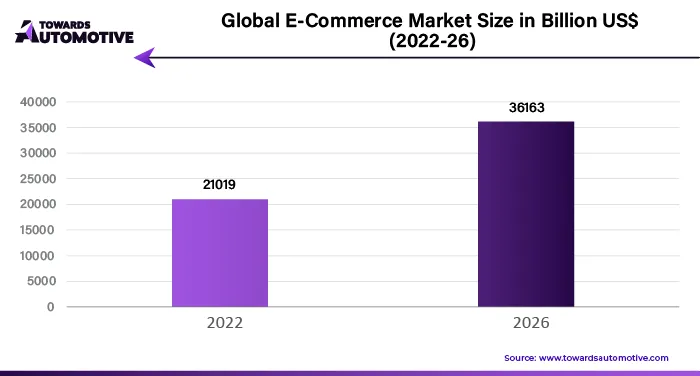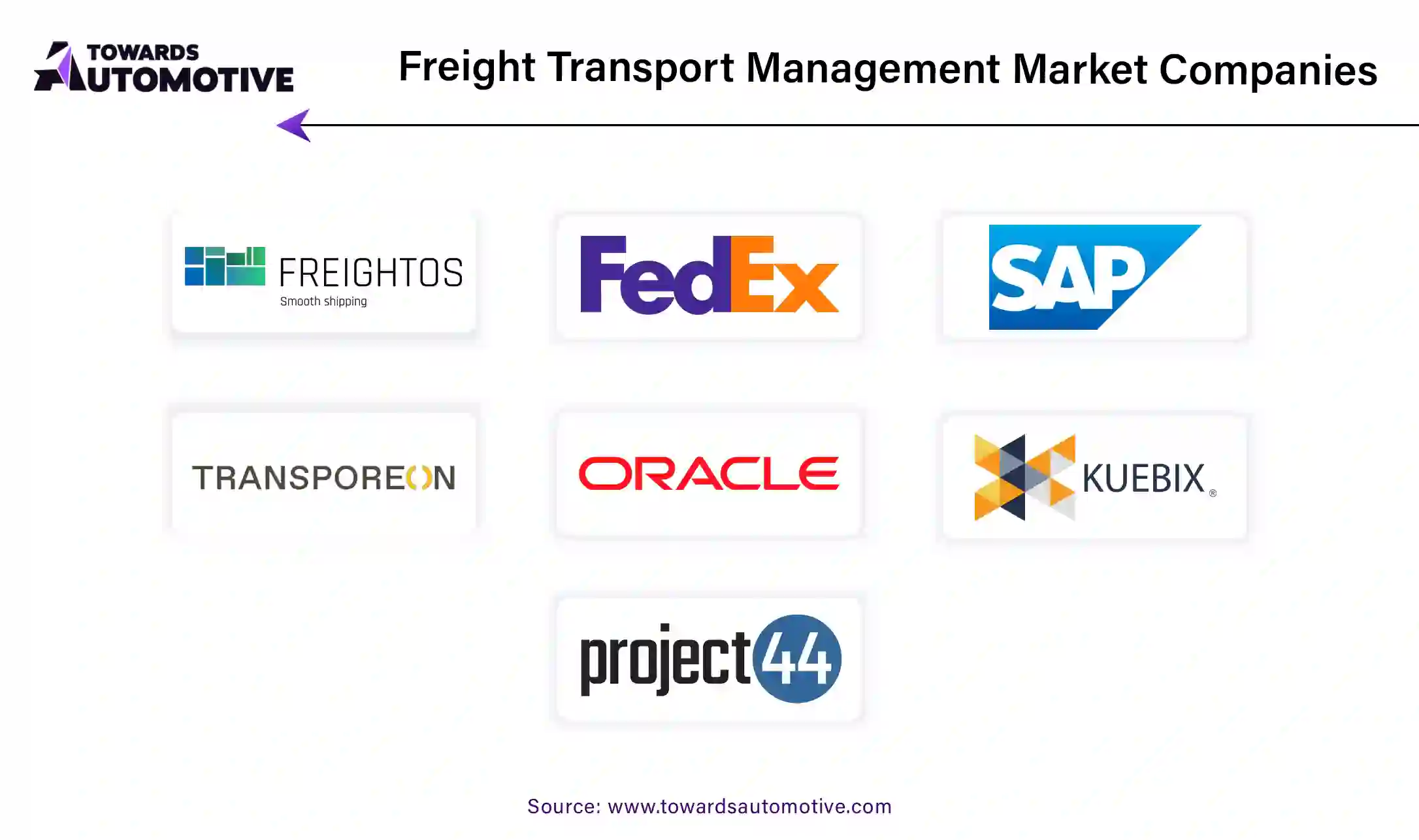March 2025

Senior Research Analyst

Reviewed By
The global freight transport management market is forecasted to expand from USD 33.93 billion in 2025 to USD 86.52 billion by 2034, growing at a CAGR of 10.96% from 2025 to 2034.

The freight transport management market is a dynamic and evolving sector that plays a critical role in the global supply chain. This market focuses on optimizing the movement of goods through various modes of transportation, including road, rail, air, and sea. With increasing globalization, growing trade activities, and the rise of e-commerce, the demand for efficient and cost-effective freight transport solutions has surged. Freight transport management systems (FTMS) are integral in ensuring the smooth flow of goods across borders and within countries, providing solutions for route optimization, real-time tracking, fleet management, inventory control, and compliance with regulations.
As businesses seek to meet the rising expectations for faster delivery times, transparency, and reliability, freight transport management has become increasingly sophisticated. Technological advancements, such as the integration of artificial intelligence (AI), Internet of Things (IoT), and big data analytics, have transformed the market by improving decision-making, predictive maintenance, and cargo visibility. Moreover, the growing focus on sustainability and environmental concerns has spurred the adoption of eco-friendly transport solutions, including electric vehicles and energy-efficient transportation modes.
The freight transport management market is expected to continue its growth trajectory, driven by the need for seamless logistics, better fuel efficiency, and enhanced customer service. With supply chain complexities becoming more pronounced, businesses are turning to advanced freight transport management solutions to address operational challenges, reduce costs, and improve overall supply chain visibility. This market is poised for continued innovation and expansion as key stakeholders invest in technological advancements and sustainable practices.
Artificial Intelligence (AI) plays a transformative role in the freight transport management market by revolutionizing the goods delivery methods. AI-powered solutions enable real-time data processing, predictive analytics, and decision-making, significantly enhancing efficiency and reducing operational costs. One of the key contributions of AI is its ability to optimize routes, helping freight operators select the most efficient paths based on traffic patterns, weather conditions, fuel consumption, and delivery time requirements. This not only reduces fuel costs but also ensures timely deliveries, which is crucial in today’s fast-paced logistics environment.
AI also enables predictive maintenance, which plays a vital role in minimizing vehicle breakdowns and downtime. By analyzing data from sensors on vehicles, AI systems can predict when maintenance is required, thus preventing unexpected failures and improving fleet reliability. Furthermore, AI helps in the management of warehouse operations by automating inventory management, sorting, and tracking of goods, ensuring faster and more accurate shipments.
Additionally, AI enhances freight tracking by providing real-time updates to both operators and customers. Using machine learning algorithms, AI systems can monitor the movement of goods and identify any potential delays, offering alternative solutions to mitigate disruptions. AI-driven chatbots and virtual assistants are also streamlining customer service, providing instant responses to queries and improving the overall customer experience. As AI continues to advance, its applications in the freight transport management market will expand, driving further innovations and improvements in operational efficiency, cost savings, and customer satisfaction.
The rapid growth of the e-commerce sector is a major driver of the Freight Transport Management Market, as it has significantly increased demand for efficient, reliable, and cost-effective logistics and delivery services. With consumers expecting faster, often same-day or next-day deliveries, e-commerce companies require advanced freight transport management solutions to ensure timely and accurate shipments. This has led to greater investment in technology to optimize transportation networks, streamline operations, and improve last-mile delivery capabilities.
As e-commerce businesses expand their global reach, they also face the challenge of managing a vast and complex logistics network, which includes coordinating transportation, warehousing, inventory management, and order fulfillment. Freight transport management systems, including AI-powered tools for route optimization, real-time tracking, and automated supply chain management, help e-commerce companies meet these demands by enhancing operational efficiency and reducing costs.
Additionally, the shift toward more sustainable and eco-friendly transportation options, such as electric vehicles and alternative fuel sources, is being driven by e-commerce companies looking to reduce their carbon footprint and meet consumer demand for green logistics solutions. As the e-commerce sector continues to grow, especially in regions like North America and Asia Pacific, the need for innovative freight transport management solutions will become even more critical. This demand is fostering greater investment in technologies that improve freight efficiency, reduce delivery times, and increase customer satisfaction, which in turn fuels the overall growth of the Freight Transport Management Market.

The Freight Transport Management Market faces several restraints, including high operational costs, regulatory challenges, and infrastructure limitations. Rising fuel prices and maintenance expenses can significantly impact the profitability of transportation providers. Strict regulations regarding emissions, safety standards, and customs procedures can add complexity to logistics operations, particularly in cross-border trade. Additionally, inadequate infrastructure in certain regions, including congested roads and outdated transport systems, limits the efficiency of freight transport, hindering the overall market growth and scalability.
The growing adoption of autonomous delivery systems presents significant opportunities in the Freight Transport Management Market, as it is poised to transform the logistics and transportation landscape. Autonomous vehicles, including drones, self-driving trucks, and robotic delivery systems, offer the potential to drastically reduce labor costs, improve delivery efficiency, and optimize transportation networks. By eliminating the need for human drivers, autonomous systems can operate around the clock, reducing delivery times and enhancing supply chain responsiveness.
Additionally, autonomous delivery systems are equipped with advanced technologies like AI, machine learning, and IoT, enabling real-time monitoring, route optimization, and predictive analytics, which further enhances operational efficiency. These systems also contribute to reducing traffic congestion and carbon emissions by optimizing delivery routes and enabling the use of electric-powered vehicles.
The shift toward autonomous deliveries is particularly beneficial for last-mile delivery, a critical segment of the logistics industry. Drones and ground-based robots can navigate congested urban areas more efficiently than traditional vehicles, delivering goods directly to customers in a timely and cost-effective manner. As regulatory frameworks evolve to accommodate autonomous delivery technologies, the opportunities in the Freight Transport Management Market are expanding rapidly. Companies are increasingly investing in these systems to meet the growing demand for faster, more efficient, and environmentally friendly delivery solutions. As a result, the growing adoption of autonomous delivery systems is driving innovation and growth within the Freight Transport Management Market, enabling businesses to enhance their competitive edge and meet the evolving demands of consumers.
The road freight segment held the largest share of the market. The road freight segment is a significant driver of growth in the Freight Transport Management Market, particularly due to its flexibility, cost-effectiveness, and widespread use in the movement of goods. Road freight offers the ability to transport goods door-to-door, making it the most commonly used mode of freight transport for short to medium distances. As global trade continues to expand, the demand for efficient and reliable road freight services has grown rapidly. This has prompted businesses to invest in advanced freight transport management solutions, such as route optimization, real-time tracking, and fleet management systems, to improve operational efficiency and reduce costs.
Moreover, the growth of e-commerce and the increasing expectation of faster delivery times have further boosted the demand for road freight services, as it plays a crucial role in last-mile delivery solutions. The integration of technology in the road freight sector, such as the adoption of AI, GPS tracking, and telematics, has enhanced the ability to manage and monitor shipments in real-time, reducing delays and improving overall service quality.
Additionally, road freight is essential for the distribution of goods across regions and within urban areas, facilitating the flow of products through supply chains. With the increasing globalization of trade and the expansion of logistics networks, the road freight segment continues to be a driving force behind the growth of the Freight Transport Management Market, enabling businesses to meet the rising demand for efficient, flexible, and reliable transportation solutions.
The third-party logistics segment led the industry. The third-party logistics (3PL) segment is a key driver of growth in the Freight Transport Management Market, as it enables businesses to outsource their logistics and supply chain functions to specialized service providers. With the increasing complexity of global trade, e-commerce growth, and the need for efficient, cost-effective logistics solutions, companies are increasingly turning to 3PL providers to manage their transportation needs. 3PL providers offer a range of services, including freight forwarding, warehousing, inventory management, and last-mile delivery, which allow businesses to focus on their core competencies while optimizing their logistics operations. The growth of e-commerce, in particular, has significantly contributed to the expansion of the 3PL market, as online retailers require sophisticated freight management solutions to meet customer demands for fast and reliable delivery.
Moreover, the adoption of advanced technologies, such as AI, IoT, and cloud computing, by 3PL providers has enhanced the efficiency of their operations, enabling them to offer real-time tracking, route optimization, and predictive analytics, all of which contribute to improved delivery times and reduced costs. The ability of 3PL providers to manage complex logistics networks, particularly for cross-border trade, has also driven their increasing adoption by businesses. As global trade continues to grow and consumer expectations for faster deliveries rise, the 3PL segment will continue to play a pivotal role in driving the growth of the Freight Transport Management Market, offering businesses scalable, efficient, and technology-driven solutions to meet their transportation needs.
North America dominated the freight transport management market. The growth of the Freight Transport Management Market in North America is largely driven by a combination of e-commerce expansion, global trade agreements, and infrastructure investments. E-commerce has rapidly transformed the logistics landscape, with increasing demand for quick, efficient, and reliable delivery services. As consumers expect fast shipping, businesses are investing in robust freight transport systems to meet these needs. This demand for faster and more flexible delivery models has fueled the growth of freight management technologies, including route optimization and real-time tracking systems.
Furthermore, North America’s position as a global trade hub has also contributed to the market’s growth. Trade agreements such as the North American Free Trade Agreement (NAFTA) and the US-Mexico-Canada Agreement (USMCA) have promoted cross-border commerce, requiring efficient freight management solutions to handle the growing volume of goods moving between the U.S., Canada, and Mexico. These agreements foster greater economic integration, enabling seamless movement of goods across borders and increasing the need for advanced logistics infrastructure.
Additionally, significant infrastructure investments, including the expansion and modernization of highways, railways, ports, and airports, have bolstered the efficiency of the region's transportation network. Improved infrastructure helps to reduce bottlenecks, enhance the movement of goods, and reduce delivery times, all of which drive the demand for advanced freight transport management solutions. Thus, the above-mentioned factors are helping to streamline operations, reduce costs, and improve service quality, thereby propelling the growth of the freight transport management market in this region.
Europe is expected to grow with a significant CAGR during the forecast period. The Freight Transport Management Market in Europe is experiencing significant growth due to several key factors, including urbanization, technological advancements, and cross-border trade within the EU. Urbanization in Europe has led to an increased demand for efficient urban freight solutions as cities become more congested and consumer expectations for faster deliveries rise. This has spurred the adoption of last-mile delivery services and eco-friendly transport options, such as electric vehicles, to ensure timely, sustainable deliveries. As urban areas grow, there is also a greater need for advanced freight management systems to optimize routes and reduce congestion, thereby driving market growth.
Also, technological advancements, including the integration of Artificial Intelligence (AI), the Internet of Things (IoT), and automation, have also played a pivotal role in enhancing freight transport efficiency. AI-powered tools are used for predictive analytics, real-time tracking, and route optimization, while IoT devices allow for continuous monitoring of shipments and vehicles, improving visibility and operational efficiency.
Furthermore, the EU’s internal market and its border-free system have encouraged cross-border trade between member states, further boosting the demand for freight transport services. The removal of trade barriers and harmonized regulations across the EU make it easier to move goods throughout Europe, creating a need for streamlined, efficient logistics operations.

By Transportation Mode
By Logistics Type
By Service
By Customer Type
By Region
March 2025
March 2025
March 2025
March 2025
Dr. Arjun Patel is a distinguished expert in the automotive industry, holding advanced degrees in Automotive Engineering and Mechanical Engineering. His expertise spans automotive market dynamics, technological advancements, and sustainable practices. Dr. Patel excels in conducting in depth research and analysis on market trends, consumer preferences, and the economic implications within the automotive sector. He is renowned for his insightful publications on topics such as electric vehicles, autonomous driving technologies, and the evolution of sustainable transportation solutions. Dr. Patels research contributions have significantly advanced understanding in the field, earning him recognition as a leading authority in automotive research and analysis.
We offer automotive expertise for market projections and customizable research, adaptable to diverse strategic approaches.
Contact Us